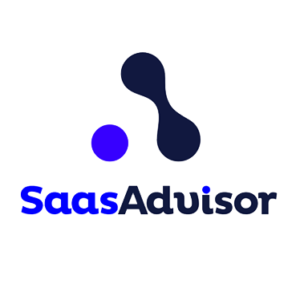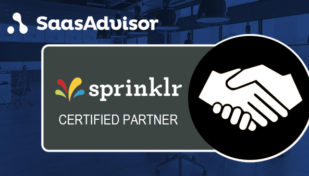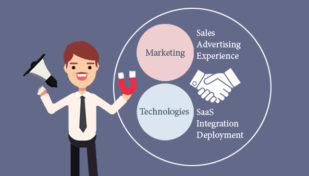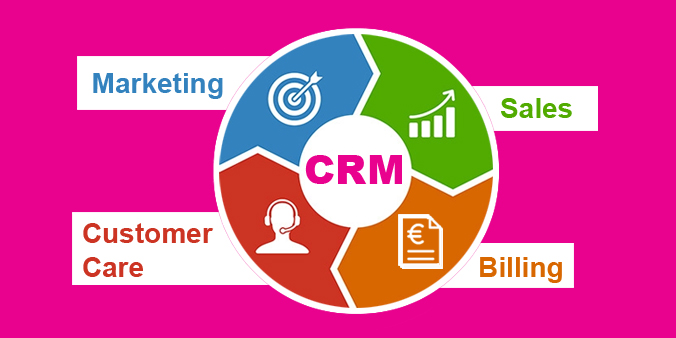
Martech Market Analysis
What is CRM? What do I Need to Know?
If you work or are familiar with the business sphere, chances are you have heard of CRM. CRM stands for Customer Relationship Management, and it is not only a technology but a strategy and philosophy as well. In the ever expanding martech world, CRMs are one of the most widely used and recognized technologies out there. In fact, CRM is the fastest growing marketing software with a market value of $120 billion. (Source: Martechzone)
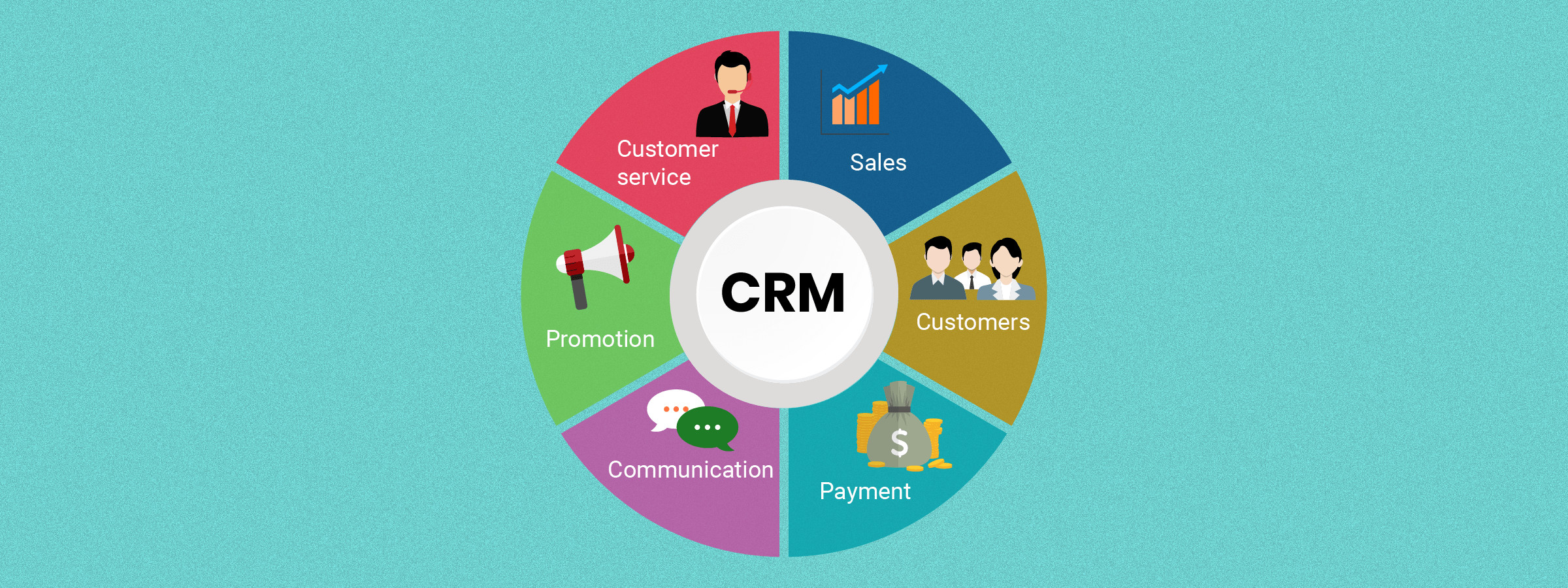
At Saas Advisor, we have conversations with our clients frequently about their CRM systems, and the confusion that can arise when knowing exactly what they are used for and what their value can be to their bottom line. That is why we will dive into what a CRM is to give you a better understanding of how it can work for you and your business.
This article will cover the following topics:
- What is CRM Marketing?
- What is a CRM system?
- What is the difference between ERP and CRM?
- What are the most popular and reputable solutions?
- Are there CRM Consultants? Where can I find them?
What is CRM Marketing?
CRM Marketing often refers to the strategy businesses who have adopted this model use to conduct business and interact with customers. More specifically, to the strategies and tactics as well as the technologies that marketers use to manage the relationship between their company and its customers throughout the entire customer journey.
The main goal of CRM Marketing is to improve, optimize, and perpetuate customer relationships in order to accomplish:
- Better customer loyalty
- Higher retention
- Increased revenue
- Improved customer service
- Improved customer lifetime value
Customer Relationship Management is essentially a philosophy about how relationships with customers and potential customers should be managed. CRM puts customers at the center of all business decisions and trusts that building healthy relationships with their customers is what will help their business grow. For most businesses, the most important asset is their customer base. When those customers have negative experiences or negative relationships are formed, this can be detrimental to businesses, especially today, when the competition is so high. In fact, 73% of customers point to customer experience as an important factor in their purchasing decisions (Source: Martech Zone). That is why an effective customer relationship strategy is imperative.
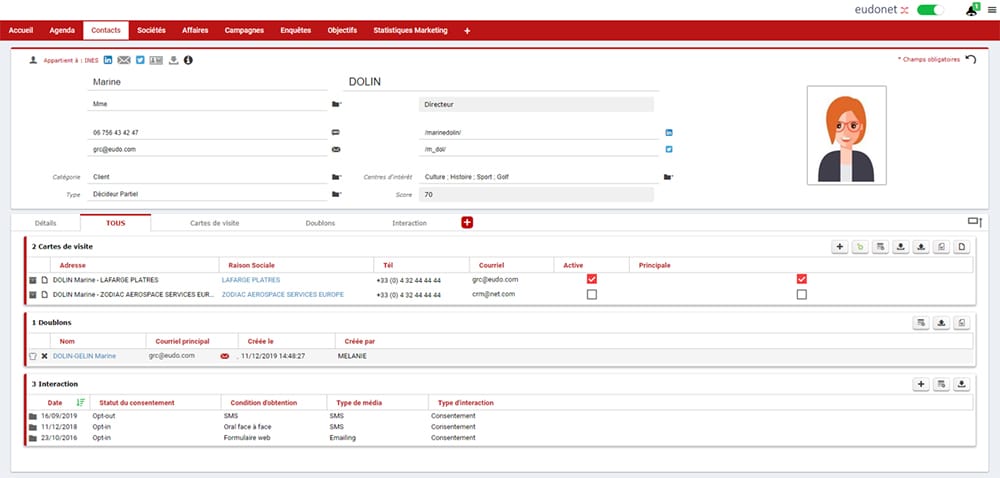
By adopting a customer-centric approach, businesses can enjoy a deeper understanding of who their customers are, what they want, and how best to optimize their customer experience.
What is a CRM system?
Now that we understand the concept of CRM, it is time to dive into what a CRM system is. When people talk about CRM, they are usually referring to a CRM system. A CRM system is a tool that is used for contact management, sales management, productivity, and more. The goal of a CRM system is simple: Improve customer relationships.
In the world of technology, B2B, social media, and more, customers and their loyalty have become the priority for most businesses, which is what we can attribute to the rise of not only CRM as a strategy, but as a technology as well. CRM systems are widely used in the professional sphere because of their effectiveness. In fact, 39% of companies that have integrated CRM platforms cite their data as a competitive advantage or a strategic asset. With a CRM system, most companies see a significant increase in leads, sales revenue, and customer retention. (Source: Salesforce)
Additionally, the CRM system helps you visualize your sales funnel. This refers to a visual representation of all of the stages a customer goes through during the sales process, from awareness to purchase. The sales funnel is used to track and analyze the number of leads at each stage. You will be able to see any issues in your process and be able to make any necessary improvements to improve upon your strategy. In most advanced CRM systems, you have the ability to customize each stage of your sales funnel according to your needs.
Here is an example of what the sales funnel can look like:
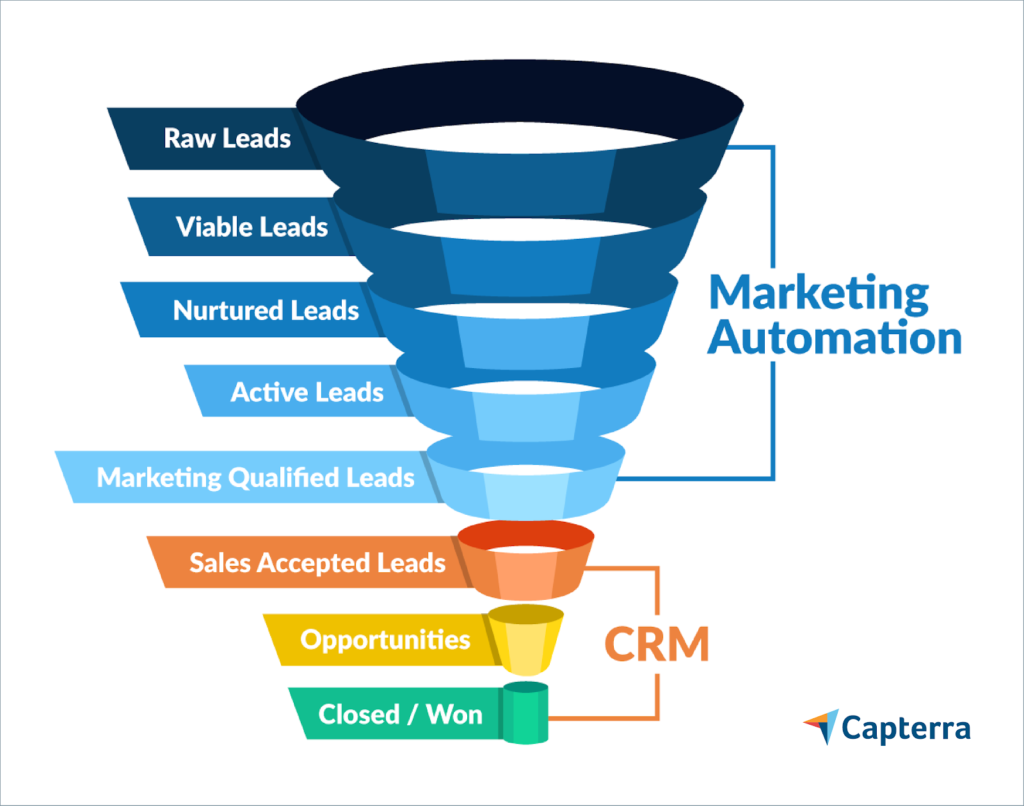
As we discussed, the CRM philosophy is customer-centric. That means that the CRM system must be as well. A CRM system needs to:
Centralize all your customer data
The main function of a CRM system is to gather, centralize and optimize customer data. A CRM system records customer contact information such as email addresses, social media accounts, phone numbers, websites, and more. On top of this, it can also automatically pull in other information like personal preferences on communication, history and interactions with your company, and more. It gives a 360° view of customers so that companies can better understand their relationship and how to improve it. This centralization is proven to improve customer retention by as much as 27%. (Source: Martech Zone)
Support a customer-centric strategy
A CRM system must support your customer-centric approach to how you do business. This all boils down to the customer experience. According to Gartner, a valuable customer experience is integral to CRM. Your CRM system must optimize the customer journey by creating a valuable experience through personalized communications, accurate data collection, and so on. This allows your company to:
- Develop sales forecasts
- Identify potential leads
- Improve customer service
- Increase sales through positive customer relationships
There is a reason so many companies use CRM systems. The average ROI for CRM is $8.71 for every dollar spent, and CRM can boost conversion rates by 300%. (Source: MartechZone)
What is the Difference Between an ERP and a CRM?
One of the biggest questions that comes up when discussing CRM systems is the difference between a CRM and an ERP. To clear up any confusion you may have, we will break down the differences to give you a clear overview of what each solution does.
First off, let’s explain what an ERP is. ERP stands for Enterprise Resource Planning. It is a term used to describe an end-to-end business solution that can connect multiple departments within an organization. These usually include: accounting, supply chain, manufacturing, human resources, and so on. An ERP is designed to improve the efficiency of your organization by streamlining your business operations to reduce costs.
Companies that use ERP systems enjoy manageable, consolidated data and accessibility to all key recipients across multiple departments. Because of this, ERPs are especially useful for large and complex companies.
ERPs give increased visibility within an organization and allows for standardized information sharing across departments. This means that if there is an issue in one department, an ERP can automatically send alerts to other departments so that you may begin the resolution process and nip any problems in the bud. This leads to fewer errors and better decision-making.
As we have discussed, a CRM system is designed to increase your organization’s profitability by managing your customer relations and streamlining all marketing activities. Just like an ERP, it streamlines processes to reduce costs, but it is more focused on the customer journey rather than internal activities.
ERPs and CRMs are both very useful tools when it comes to increasing your profits, streamlining your processes, and increasing your efficiency. A main difference is that ERPs reduce overhead costs by streamlining business processes while a CRM focuses on improving customer relationships, and therefore increasing sales.
Popular ERP solutions
If you think an ERP might be right for you and are curious about what solutions are out there, here is a list of a few industry leaders:
- Netsuite
- SAP Business One
- Sage Intacct
- Acumatica
- Odoo ERP
- Oracle E-Business Suite
- Epicor ERP
- SYSPRO
- Orion ERP
- Munis
What are the Most Popular and Reputable Solutions?
As CRM growth continues to skyrocket, many businesses now feel that a CRM system is essential to their daily operations. There are an incredible amount of CRM systems out there, many that are specifically tailored to certain businesses. However, if you are looking for a quick overview of some of the industry leaders, here are some of the most popular solutions:
- Salesforce
- Hubspot
- Active Campaign
- Freshworks
- Zoho
- Pipedrive
- Pipeliner
- SharpSpring
- Copper
- Monday.com
- Teamleader
Two of the biggest industry leaders are Salesforce and Hubspot. We want to dive a little deeper into these solutions, their strengths, weaknesses, and values to give you a better understanding of what they have to offer and which might work best for you and your business.
Salesforce
- Overview: Salesforce is a cloud-based customer relationship management platform with applications for sales, service, marketing and more that help bring customers and companies together.
- Strengths: Highly customizable, strong lead management, automatic lead scoring, in-depth reporting and analysis, able to manage complex sales processes
- Weaknesses: Implementation is complicated, it is challenging to learn, the interface can be time-consuming and confusing, less customer support, not as adapted to growing businesses as Hubspot
- Value: Salesforce is a powerful platform that works well for large enterprises and has many features that are incredibly useful for sales teams. However, the price tends to be higher and there are no free options.
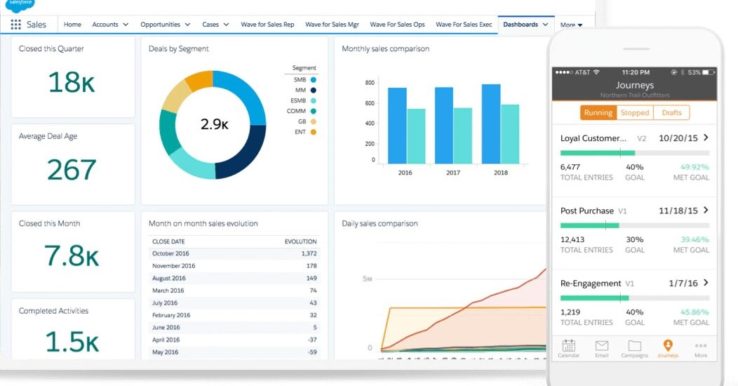
Hubspot
- Overview: HubSpot is a cloud-based customer relationship management (CRM) platform with Marketing Hub, Sales Hub, Service Hub, and CMS Hub software applications that help scaling companies grow better.
- Strengths: Strong UX, easy-to-use and dynamic dashboard and reporting functionalities, great for scaling businesses, many free options available
- Weaknesses: Less customization is some areas, must pay for lead scoring, dashboard limits, Salesforce outperforms when it comes to complex sales processes.
- Value: Hubspot is an easy-to-use platform with great resources and free options for smaller businesses. However, it is often outranked by Salesforce on websites such as Capterra and G2.

While every business is different, it is generally understood that if you are a small to medium sized business, Hubspot is much more adapted to your needs. On the other hand, for large businesses with complex sales processes and a need for in-depth reporting, Salesforce would probably be your best bet.
Want to know more about our solutions for choosing and deploying a CRM?Click here!
Are There CRM Consultants? Where Can I Find Them?
In short: yes, they do! A CRM consultant is someone who provides support for businesses to improve their customer service practices. CRM consultants work with businesses to identify areas where customer service could be improved, which might mean introducing a new CRM software or training employees on best practices.
At Saas Advisor, we have helped several clients pilot the RFP process when it came time to choose the CRM for their business. Here is how it works: We are able to precisely define your needs which allows us to establish an initial “shortlist” of relevant and potential solutions. We then establish an extremely precise analysis chart on the essential and desired features. We take into account your internal resources, the functionalities and support of software providers, and the integration with your existing platforms.
Our goal is to improve maximum continuity throughout your digital ecosystem. To accomplish this, Saas Advisor helps you every step of the way from identification of your needs, to the selection of a software, and finally to the implementation of your chosen solution. We help you apply your business cases and train your team to be able to take full advantage of your selection.
Curious to learn more about Hubspot?
Check out this article dedicated to the Hubspot CRM!
If you have questions on how Saas Advisor can help your business choose a CRM solution, contact us.
Discover our other posts
Ready to get started?
Terms of Use
Site web publié par :
Best of breed consulting, ci après désignée comme “l’éditeur”
SAS au capital de 3000 euros
Adresse : 16 rue des taillandiers, 75011
Courriel : hello@saas-advisor.com
Directeur de publication : Jonathan Charbit
Site hébergé par :
OVH SAS
Siège social : 2 rue Kellermann – 59100 Roubaix – France
Téléphone : 09 72 10 10 07
https://www.ovh.com
1 – Vie privée
L'éditeur ne collecte sur ce site internet aucune donnée à caractère personnel autre que des données statistiques qui ne permettent pas de vous identifier.
Vous pouvez néanmoins nous adresser des mails. Veuillez noter qu’en vertu des lois applicables, vous disposez d’un droit d’accès, de rectification ou d’effacement, de limitation ou d’opposition au traitement ainsi qu’un droit de portabilité de vos données personnelles.
En conséquence vous disposez du droit :
- d’accéder à vos données personnelles, notamment pour vérifier leur exactitude et leur exhaustivité
- pour des raisons légitimes, de demander une rectification de vos données
- de vous opposer ou demander une limitation du traitement de vos données personnelles
- de recevoir vos données personnelles sous un format standard et structuré
- de donner des instructions sur le traitement de vos données après votre mort
Pour tous les cas cités ci-dessus, merci de nous envoyer un mail à l’adresse suivante : hello@saas-advisor.com
2 - Gestion des cookies
Les cookies sont des petits fichiers déposés sur votre ordinateur ou sur le terminal que vous utilisez lorsque vous visitez un site internet. Ils sont largement utilisés pour permettre aux sites internet de fonctionner ou d’améliorer leur fonctionnement. Ils permettent aux sites de reconnaître votre terminal et d’enregistrer des informations relatives à votre navigation.
Lors de la consultation du présent site internet, des cookies sont déposés sur votre ordinateur, tablette ou smartphone :
- Cookies liés à Google Analytics (un service d’analyse fourni par Google pour mesurer l’audience du site)
Tous les navigateurs permettent de paramétrer les cookies, les bloquer ou les supprimer. Vous trouverez ci-après des liens vers les explications fournies par les principaux navigateurs : ChromeFirefox Internet Explorer Safari
3 - Droit de Propriété Intellectuelle
A l’exception du logo de SaaS Advisor les logos affichés sur le site internet sont la propriété de leur titulaires respectifs. SaaS Advisor n’est pas affilié à ces marques.
Le présent site internet ainsi que l'ensemble de son contenu, à l’exception des logos de marques tierces, sont protégés par le droit français de la propriété intellectuelle et sont la propriété et l’éditeur. Toute reproduction sans l’accord de l’éditeur est par conséquent prohibée.
4 - Lien Hypertexte
L’existence d’un lien entre le présent site internet et un site tiers ne signifie en aucun cas que l’éditeur approuve à quelque titre que ce soit le contenu de ce site ou l’usage qui pourrait en être fait. L’éditeur n’a aucune maîtrise sur le contenu des sites tiers et ne peut en contrôler les contenus dans le temps.
Des sites externes peuvent par ailleurs contenir des liens hypertextes pointant vers le présent site internet. L’éditeur n’est pas davantage responsable du contenu de ces sites externes.
5 - Décharge de responsabilité
L’éditeur s’efforce d’assurer l’exactitude et la mise à jour des informations diffusées sur le présent site internet, et se réserve le droit d’en corriger le contenu à tout moment et sans préavis. Il n’offre néanmoins aucune garantie quant à l’exactitude, la précision, l’exhaustivité ou l’adéquation des informations mises à disposition sur le présent site internet, et sa responsabilité ne saurait être engagée en cas d’erreur ou d’omission.
Privacy Policy
La présente politique de protection de la vie privée est destinée à vous informer sur la façon nous collectons et utilisons vos données à caractère personnel. Pour toutes questions à ce sujet, merci de nous contacter à l’adresse suivante : hello@saas-advisor.com
Identification
Best of breed consulting, SAS au capital de 3000 euros
Adresse : 16 rue des taillandiers, 75011
Courriel : hello@saas-advisor.com
Directeur de publication : Jonathan Charbit
https://www.ovh.com
Pourquoi ce document ?
La présente politique de protection de la vie privée décrit le traitement de données à caractère personnel effectué en lien avec le service proposé par SaaS Advisory. En tant qu’entreprise, nous sommes responsables du traitement de vos données à caractère personnel.
Quelles données personnelles recueillons-nous à votre sujet ?
Nous recueillons uniquement les données de fréquentation du site internet et les données que vous êtes susceptibles de nous communiquer dans le cadre des services que nous proposons.
Comment exercer vos droits ?
Conformément aux lois françaises et européennes applicables, vous avez le droit :
- d’accéder à vos données personnelles pour vous assurer que vos informations personnelles sont à jour, exactes et complètes
- de nous demander de mettre à jour, corriger ou compléter toute donnée personnelle inexacte ou incomplète
- de vous opposer, pour des raisons légitimes, au traitement de vos données personnelles
- de recevoir, sur demande, toutes vos données personnelles dans un format structuré et standard
- de donner des instructions concernant le traitement de vos données personnelles après votre décès.
Pour exercer l'un des droits ci-dessus, veuillez nous contacter à l’adresse suivant : hello@saas-advisor.com
À qui vos données personnelles sont divulguées ?
Nous ne partageons, vendons ou transférons aucune donnée personnelle avec des tiers à des fins commerciales.
Nous pouvons partager vos données personnelles avec des entreprises partenaires afin que nous obtenions l'assistance et le soutien nécessaires dans le cadre de la réalisation de nos services (hébergement des données par exemple). Nous nous assurons que tous les tiers avec lesquels nous travaillons sont conformes au Règlement (RGPD) et, le cas échéant, certifiés Privacy Shield.
Nous pouvons également divulguer vos données personnelles aux autorités compétentes, si la loi nous l’impose.
Mises à jour de cette politique de confidentialité
Nous nous réservons le droit de mettre à jour la politique de confidentialité à tout moment. La date de la dernière révision est indiquée en en-tête du présent document.
